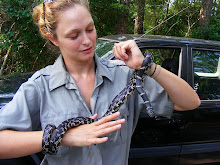
In honor of today being Blog Action Day, I want to talk a little bit about climate change and imagination.
At first you might think the two have nothing to do with each other, other than some general feel-good lessons for us all--like I did. I let go of my cynicism and completely changed my mind and after I read a thesis from the University of California Berkeley Energy and Resources Group: Bryant Carter Brooks's thesis entitled "Who will cry for the ice? An examination of conceptual understanding of climate change through metaphor." And now I think it is essential that we understand our assumptions and the way that we construct ideas with language if we are going to begin to think about climate change coherently.
The thesis is based largely around interpreting conceptions of climate change based on the metaphors we use to describe it. If I had to classify its genre, I would say that the thesis does not neatly fall into a particular discipline, but is some cross between applied linguistics and an act of activism through philosophy. It sits somewhere between the realms of science and psychology, in that it asks us to picture science through metaphor, and systematically examine what we are excluding and misrepresenting by doing so.
Brooks’s thesis is also something of a work of poetry in itself, as it is— through its conversation on how language shapes perception—a compelling look at a world without ice, a consideration of the human imagination, and a series of metaphors that add up to a picture of humanity imagining its world.
At the beginning of his thesis, Brooks makes and repeats the claim that climate change and a world without ice is a crisis of imagination. Landscape, and the concept of landscape, is imagination, and the shapes of mountains, the very perception and understanding of life and death in the earth system are expressions of imagination.
But the failure of politicians to imagine a way to implement clean energy without coming into economic conflict with the powers that be not only represents a failure of imagination, but a crisis of it. What does it mean? --he asks, to be in such a drastically changing world? I read in this an implicit question about whether, as we mourn for the lack of ice we have created, it is that we are mourning for ourselves, and lamenting our own failures of imagination.
Introducing the concept of metaphor, Brooks lists some standard forms of metonymy (defined on the Wikipedia as “a figure of speech used in rhetoric in which a thing or concept is not called by its own name, but by the name of something intimately associated with that thing or concept,” e.g. “lend me your ear”), but doesn’t engage in the jargon of linguistics to do so. Instead, he gives examples in clear, direct ways that a layperson could understand. He keeps this tone through the entire thesis, and for this reason, I would love to see his thesis published as a book for general audiences.
Building on this basic information, Brooks talks about the many metaphors for climate change and the implications they have when we use them. Brooks deconstructs climate change metaphors and shows how the influence our perception and interfere with our ability to truly understand the problem. “An exploration of conceptual metaphor with respect to climate change,” writes Brooks, “not only promises to reveal how we think about climate change, but [is] also illustrative of the difficulties of communicating what we understand scientifically.”
A few examples of metaphor as they relate to climate change:
Warming and warmth perceived as comfort and affection;
The earth as a body (leading to expressions about the health of the planet);
The atmosphere as a container (leading to a perception of its finiteness with respect to pollution);
Global warming as a temperature increase (leading to the reductionist 1-dimensional problem);
Change is motion (leading to the counter-metaphors of “slowing” and “stopping” global warming, as well as the misunderstanding of the “impacts” of global warming being like temporally isolated collisions);
Climate is a hazard or obstacle; also, the earth is a ship or vessel (and our path through climate change as a ship about to hit an iceberg—ironic! he notes);
Climate is an invading force (to be fought).
Metaphor, Brooks points out, can mislead, or reduce the problem to one aspect of its many effects, which in turn can lead to misguided action or lack of action. What is at stake is not simply rising temperatures, but the very fabric of life on earth dissolving. Our language needs to reflect the many implications of climate change, and the urgency with which it must be addressed in order to maintain conditions on the planet that are compatible with human civilization.
I won't go deeper into how Brooks analyzes the scientific and social framing of the question of climate change. I will say that he is able to phrase complicated questions very simply, without missing the subtlety of the subject matter.
Beautiful, compelling, imaginative. And maybe a vision of a way to engage the real meaning of this climate crisis we face.
-----------
Thanks for reading.
Also, please take a moment to visit my friend Dustin's blog: http://chartporn.org/




3 comments:
Brilliant!
Reminiscent of Sontag's 'Illness as Metaphor; AIDS and Its Metaphors' -- also good readin'.
Post a Comment